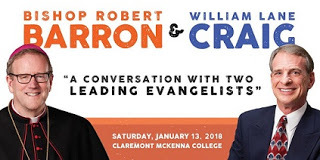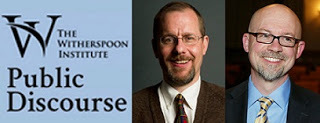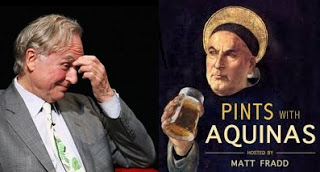Edward Feser's Blog, page 60
December 1, 2017
Feser vs. Ahmed on Unbelievable?
 Recently, on the UK radio program Unbelievable? with Justin Brierley, I debated atheist philosopher Arif Ahmed on the subject of my book
Five Proofs of the Existence of God
. You can now listen to the debate online.Other recent interviews about the book include those on
The Ben Shapiro Show
,
The Andrew Klavan Show
,
The Dennis Prager Show
,
The Michael Medved Show
,
The Patrick Coffin Show
,
Pints with Aquinas with Matt Fradd
, and many others. Further media appearances forthcoming. Stay tuned.
Recently, on the UK radio program Unbelievable? with Justin Brierley, I debated atheist philosopher Arif Ahmed on the subject of my book
Five Proofs of the Existence of God
. You can now listen to the debate online.Other recent interviews about the book include those on
The Ben Shapiro Show
,
The Andrew Klavan Show
,
The Dennis Prager Show
,
The Michael Medved Show
,
The Patrick Coffin Show
,
Pints with Aquinas with Matt Fradd
, and many others. Further media appearances forthcoming. Stay tuned.
Published on December 01, 2017 16:29
November 28, 2017
Reply to Griffiths and Hart
 By Man Shall His Blood Be Shed: A Catholic Defense of Capital Punishment
received some pretty nasty reviews from Paul Griffiths in First Things and David Bentley Hart in Commonweal. My response to Griffiths and Hart can now be read at Catholic World Report.My three-part reply to the objections recently raised by E. Christian Brugger and Christopher Tollefsen can be found at Public Discourse. My replies to the criticisms raised by Robert Fastiggi can be found at Catholic World Report.
By Man Shall His Blood Be Shed: A Catholic Defense of Capital Punishment
received some pretty nasty reviews from Paul Griffiths in First Things and David Bentley Hart in Commonweal. My response to Griffiths and Hart can now be read at Catholic World Report.My three-part reply to the objections recently raised by E. Christian Brugger and Christopher Tollefsen can be found at Public Discourse. My replies to the criticisms raised by Robert Fastiggi can be found at Catholic World Report.
Published on November 28, 2017 22:51
November 25, 2017
Barron and Craig event
 On Saturday, January 13, 2018, the Claremont Center for Reason, Religion, and Public Affairs will host “A Conversation with Bishop Robert Barron and William Lane Craig” at Claremont McKenna College. The moderators of the discussion will be Stephen Davis and Edward Feser. The event is free but registration is required. More information here.Further details forthcoming.
On Saturday, January 13, 2018, the Claremont Center for Reason, Religion, and Public Affairs will host “A Conversation with Bishop Robert Barron and William Lane Craig” at Claremont McKenna College. The moderators of the discussion will be Stephen Davis and Edward Feser. The event is free but registration is required. More information here.Further details forthcoming.
Published on November 25, 2017 15:23
November 21, 2017
Reply to Fastiggi
 In a recent article at Catholic World Report, Prof. Robert Fastiggi defends the claim that the Church could reverse her traditional teaching that capital punishment is legitimate in principle. My reply to Fastiggi has now been posted at CWR.Meanwhile, all three of my articles replying to Brugger and Tollefsen have now been posted at Public Discourse. Next on the agenda: replies to Griffiths and Hart. Stay tuned.
In a recent article at Catholic World Report, Prof. Robert Fastiggi defends the claim that the Church could reverse her traditional teaching that capital punishment is legitimate in principle. My reply to Fastiggi has now been posted at CWR.Meanwhile, all three of my articles replying to Brugger and Tollefsen have now been posted at Public Discourse. Next on the agenda: replies to Griffiths and Hart. Stay tuned.
Published on November 21, 2017 19:18
November 19, 2017
Reply to Brugger and Tollefsen (Updated again)
 UPDATE 11/21: Part 3 has also now been posted.
UPDATE 11/21: Part 3 has also now been posted.UPDATE 11/20: Part 2 has now been posted.
In a recent series of articles at Public Discourse, E. Christian Brugger (hereand here) and Christopher Tollefsen (here and here) have criticized By Man Shall His Blood Be Shed: A Catholic Defense of Capital Punishment . This week, Public Discourse is running my three-part reply. Part 1 has now been posted.My reply to Robert Fastiggi’s most recent Catholic World Report article will also appear this week at CWR. Replies to Paul Griffiths’ review in First Things and David Bentley Hart’s review in Commonweal are also forthcoming. Stay tuned.
Published on November 19, 2017 19:12
Reply to Brugger and Tollefsen (Updated)
 UPDATE 11/20: Part 2 has now been posted.
UPDATE 11/20: Part 2 has now been posted.In a recent series of articles at Public Discourse, E. Christian Brugger (hereand here) and Christopher Tollefsen (here and here) have criticized By Man Shall His Blood Be Shed: A Catholic Defense of Capital Punishment . This week, Public Discourse is running my three-part reply. Part 1 has now been posted.My reply to Robert Fastiggi’s most recent Catholic World Report article will also appear this week at CWR. Replies to Paul Griffiths’ review in First Things and David Bentley Hart’s review in Commonweal are also forthcoming. Stay tuned.
Published on November 19, 2017 19:12
Reply to Brugger and Tollefsen
 In a recent series of articles at Public Discourse, E. Christian Brugger (hereand here) and Christopher Tollefsen (here and here) have criticized
By Man Shall His Blood Be Shed: A Catholic Defense of Capital Punishment
. This week, Public Discourse is running my three-part reply. Part 1 has now been posted.My reply to Robert Fastiggi’s most recent
Catholic World Report article
will also appear this week at CWR. Replies to Paul Griffiths’ review in First Things and David Bentley Hart’s review in Commonweal are also forthcoming. Stay tuned.
In a recent series of articles at Public Discourse, E. Christian Brugger (hereand here) and Christopher Tollefsen (here and here) have criticized
By Man Shall His Blood Be Shed: A Catholic Defense of Capital Punishment
. This week, Public Discourse is running my three-part reply. Part 1 has now been posted.My reply to Robert Fastiggi’s most recent
Catholic World Report article
will also appear this week at CWR. Replies to Paul Griffiths’ review in First Things and David Bentley Hart’s review in Commonweal are also forthcoming. Stay tuned.
Published on November 19, 2017 19:12
November 18, 2017
Two further ideas about development of doctrine
 Go read Mike Pakaluk’s excellent brief article “Four Ideas About Development” at First Things, then come back. Welcome back. Here are a couple of further thoughts to add to his:
Go read Mike Pakaluk’s excellent brief article “Four Ideas About Development” at First Things, then come back. Welcome back. Here are a couple of further thoughts to add to his: Fifth, development is properly spoken of in the passive voice rather than the active voice. It always drives me crazy when Catholics, including churchmen, go around talking about whether a pope will or will not “develop” this or that doctrine. Development is essentially something that happens. It is not an activity that a pope or anyone else decides to carry out when he gets some bright idea into his head.Through the course of the centuries, the Church faces various doctrinal crises – involving Arianism, Pelagianism, or what have you – and has to make a decision as to what orthodoxy requires. In hindsight, we can see how doctrine developed as these decisions were made. Naturally, the decisions involved conscious deliberation, but they were essentially reactive rather than proactive. The question was: “We’re faced with this new idea; what does the deposit of faith force us to say about it?” The question was not: “We’ve come up withthis new idea; can we get away withsaying it, given the deposit of faith?”
In a blurb on the back cover of E. Christian Brugger’s book Capital Punishment and Roman Catholic Moral Tradition, Germain Grisez notes that Brugger “explores and defends the proposition that the Catholic Church could teach that capital punishment is always morally wrong” (emphasis added). But development is not a matter of looking for loopholes by which the Church “could teach” some novel doctrine you’ve come up with. The Church either already teaches something, at least implicitly, or she does not. If she does, then naturally she could teach it. But if she doesn’t, then she can’t teach it. As the First Vatican Counciltaught:
For the Holy Spirit was promised to the successors of Peter not so that they might, by his revelation, make known some new doctrine, but that, by his assistance, they might religiously guard and faithfully expound the revelation or deposit of faith transmitted by the apostles.
And as Pope St. Pius X exclaimed: “Far, far from the clergy be the love of novelty!”
In his book on Aquinas, Chesterton says, concerning the development of doctrine:
When we talk of a child being well-developed, we mean that he has grown bigger and stronger with his own strength; not that he is padded with borrowed pillows or walks on stilts to make him look taller. When we say that a puppy develops into a dog, we do not mean that his growth is a gradual compromise with a cat; we mean that he becomes more doggy and not less.
Now, part of the point here is that a true development of doctrine is neither the introduction into Catholic teaching of some novelty from outside (which would be like putting pillows and stilts on a child) nor the reversal of past teaching (which would be like a puppy becoming less dog-like). But the example also illustrates the point (whether Chesterton meant it to or not) that development is something that happens rather than something the Church does. A child’s developing is not like a child’s stretching. It is not something he tries to do.
Unsurprisingly, then, proposals that doctrine be actively “developed” in this or that direction end up resembling amputations of doggy parts or strapping pillows, stilts, and the like onto a child. To cash out the metaphors, such proposals involve ignoring aspects of past teaching that conflict with a proposed novelty, strained reinterpretations of texts that contradict the novelty, claiming to see novel theses asserted in ancient texts that have never historically been understood to assert such theses, and so forth.
That brings us to a sixth point: Much of what is peddled as “development of doctrine” these days is precisely the kind of thing Pius X condemned as modernism. Go read Pascendi Dominici Gregis . And weep.
Published on November 18, 2017 10:10
November 14, 2017
Link it! Link it good!
 On BBC Radio 4, Melvyn Bragg discusses Kant’s categorical imperative with David Oderberg and other philosophers.
On BBC Radio 4, Melvyn Bragg discusses Kant’s categorical imperative with David Oderberg and other philosophers. Philosopher of science Bas van Fraassen is interviewed at 3:AM Magazine.
From Edições Cristo Rei, my book The Last Superstition is now available in a Portuguese translation.
At First Things, Rusty Reno on accommodation to liberal modernity among contemporary American conservatives and in the pontificate of Pope Francis.The Globe and Mail asks why it is so hard for a woman to find a good man these days. Mark Regnerus has the answer.
At Aeon, Michael Ruse on biology and teleology.
Newsweek interviews Reed Tucker, author of Slugfest: Inside the Epic 50-Yer Battle Between Marvel and DC .
At the Claremont Review of Books, Algis Valiunas on Martin Luther and his revolution.
What Is It Like to Be a Philosopher? interviews conservative philosopher Daniel Bonevac.
Paul Mankowski on the merits of Evelyn Waugh, at First Things.
Cluny Media launches The Thomist Tradition book series. The inaugural volume is Metaphysics and the Existence of God by Thomas C. O’Brien.
On seeing racism everywhere, via The Maverick Philosopher.
At Public Discourse, Paul DeHart critiques Leo Strauss on reason and revelation.
Kin to the Martini, it’s the Gin & It. Gin Foundry has the recipe.
At First Things, Fr. Thomas Joseph White recommends three books on Catholicism in the modern world.
Donald Fagen’s The Nightfly is 35 years old. Steely Dan’s Aja is 40. Rolling Stone on the late Walter Becker.
The Times Literary Supplement on the relentless honesty of Ludwig Wittgenstein.
David Bentley Hart contra Daniel Dennett, at The New Atlantis.
Standpoint recalls Allan Bloom’s The Closing of the American Mind.
First Things on what papal infallibility is not. Related remarks from canon lawyer Ed Peters.
Fresh Air interviews jazz pianist Dave Frishberg. His memoir My Dear Departed Past was recently published.
Los Angeles Review of Books on Reinhold Niebuhr, David Bentley Hart, and the theologian as public intellectual.
Ray Monk on the character of Gottlob Frege, at Prospect.
A. N. Wilson on the theology of Isaac Newton, at The Spectator.
Den of Geek! interviews Bryan Cranston about the new Philip K. Dick anthology series Electric Dreams.
From Bill Clinton to Harvey Weinstein and back again, at The Weekly Standard.
Keith Allen’s A Naive Realist Theory of Colour is reviewed at Notre Dame Philosophical Reviews.
Stephen Kotkin on Stalin versus Hitler, at Foreign Affairs. Kotkin’s new book on the subject reviewed at The New Criterion.
John O’Sullivan on Islam, liberalism, and the future of Europe, at the Claremont Review of Books.
Far out, man! First Comics News on Mark Voger’s new book Groovy: When Flower Power Bloomed in Pop Culture .
Published on November 14, 2017 18:44
November 7, 2017
Dawkins vs. Aquinas on Pints with Aquinas (Updated)
 UPDATE 11/14: Part two of the interview has now been posted.
UPDATE 11/14: Part two of the interview has now been posted.Recently I was interviewed by Matt Fradd for his Pints with Aquinas podcast. We talk a bit about Five Proofs of the Existence of God , but our main topic is Richard Dawkins’s critique of Aquinas’s Five Ways in The God Delusion. We work through each of the objections Dawkins raises and discuss where they go wrong. Matt is posting the interview in two parts, and the first part has now been posted.
Several other recent interviews about Five Proofsare linked to here.
Published on November 07, 2017 19:33
Edward Feser's Blog
- Edward Feser's profile
- 331 followers
Edward Feser isn't a Goodreads Author
(yet),
but they
do have a blog,
so here are some recent posts imported from
their feed.



